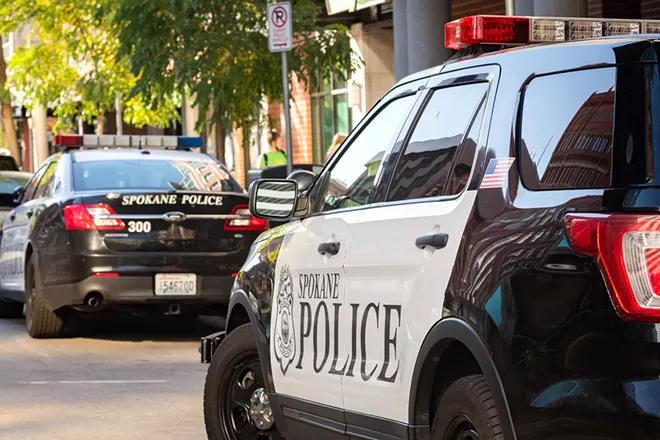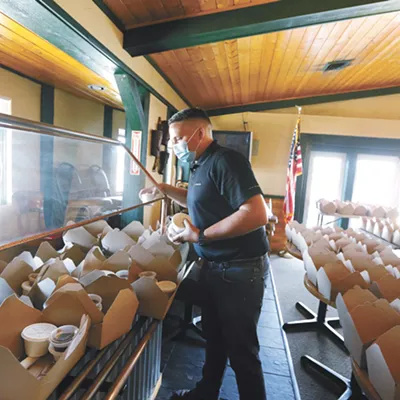The Times Square ad was part of Spokane Sheriff Ozzie Knezovich's plan. A Times Square ad that spelled "Washington" as "Washinton," to be clear, was not.
But combine the two — the $12,000 two-day Times Square billboard and a typo Knezovich blames on the ad company — and the result was the sort of cascade of free advertising that marketing executives could only dream of.
It was featured on local TV news segments across the country. It appeared in articles in newspapers like the Miami Herald and on right-wing websites like the Daily Caller. Knezovich was interviewed by CNN and on Fox and Friends.
And they all communicated the same message: Spokane County was seeking to hire dozens of deputies away from other agencies, and were offering $15,000 hiring bonuses.
"You see people leaving the profession. You've read all the articles. Google them up. Record levels of retirements at the same time that the application pool is almost nil," Knezovich says. "Our strategy: Let's go after good cops in areas that disrespected them. That's what we did. Targeted Portland, Seattle, I-5."
In some cases, he says, that's meant putting up billboard ads directly across from police precincts.
His department could use the extra help. As a share of the population they serve, Spokane County Sheriff's Department staffing levels are about as low as they've been in at least 35 years.
Law enforcement agencies across the country have reported similar challenges. In September, vacancies forced the Spokane Police Department to put their traffic unit on hold.
"Ten years ago, we would have had multiple hundreds of people on our hiring list," Spokane Police Chief Craig Meidl says. "Now we typically have less than 100."
The issue isn't new, however, and fixing it isn't simple. Even in left-leaning Seattle, voters have rejected politicians who've run on "defund the police" rhetoric. But it's one thing to fund the police. It's another to convince them to come work for you.
In a sense, the City of Spokane has defunded the police before. It eliminated dozens of police positions thanks to a budget deficit in 2004, and it defunded another 19 vacant police positions due to the Great Recession in 2012.
The number of Spokane County sheriff's deputies plunged during the recession too, and never fully recovered.
Even as the economy improved, the Washington State Patrol was shedding as many as nine officers a month. Chris Loftis, the agency's communications director says WSP salaries were so low they were leaving for other agencies.
Finally, in 2016, Loftis says, "the Legislature came through and brought our pay scale up pretty substantially."
Meanwhile, the City of Spokane's leaders had slowly restored the number of police positions, culminating with a 2019 voter-approved tax measure to pay for 20 more officers. But by the end of that year, Meidl was telling the City Council that they were having trouble recruiting to fill the spots they already had.
When the Inlander asked then what was driving the recruiting challenge, he cited negative media coverage and generational cultural shifts as factors. But the biggest issue? The economy, he said. It was too good. It made it hard to attract workers to exhausting, sometimes dangerous police jobs.
"Now there's so many other options out there, they'll go with those options," Meidl said.
If anything, the strange pandemic-era 2021 economy is even more challenging. Labor shortages mean everyone is fishing for the same workers, and spiking inflation means those workers may be looking for higher salaries as a result.
"Unemployment is the lowest it's been since 1997 in Spokane," Council President Breean Beggs says. "People are rethinking what they want to do with their lives."
Salaries are lower in the Spokane County Sheriff's Office than in the City of Spokane, but Knezovich doesn't think that's the biggest issue.
"What it really comes down to is, are you willing to get into a profession that on a daily basis is under constant fire?" Knezovich says.
Sometimes he means that figuratively — referring to the later-disproven "Hands Up, Don't Shoot" claim from the Ferguson, Missouri, protests, to the "All Cops Are Bastards" rhetoric by some protesters in 2020, to media outlets and politicians "demonizing an entire profession," to the "lunacy" of Washington Legislature's recent police reform measures, to the perception that the state's attorney general is "hellbent on arresting police officers."
But at other times officers actually are under fire: In the summer of 2016, two mass shooters — one on the far left and another on the far right — targeted police officers.
"Five Dallas cops died because of radicalized hate," Knezovich says. "Ten days later, three more in Baton Rouge."
Knezovich describes a 25-year-old female deputy and a 15-year-veteran both shaken enough by the events to want to quit entirely.
Meidl and WSP's Loftis hit many of the same notes in their own comments — the last eight years have been destabilizing for some officers.
"I think respect is part of the currency of the profession," says Loftis. "If you're being paid in dollars and not in respect, this is a dangerous and lonely job sometimes."
Against this backdrop, 542 law enforcement officers across the country have died of COVID-19 — more than every officer in the country gunned down on duty in the last 10 years combined.
But it's not fear of the virus that triggered a big exodus from the Washington State Patrol last month: It was opposition to Gov. Jay Inslee's requirement to get vaccines.
Inslee's vaccine mandate was cited in the departure of 159 WSP employees — about 7 percent of their workforce.
"I think the vaccine mandate was a period at the end of the sentence that had already been written for some," Loftis says. "For a lot of folks, it's a culmination of a tough few years."
Combined with the already existing empty positions, WSP has 256 vacancies.
But Knezovich is willing to give those departed employees a shot, too. The sheriff's office added the phrase "NO Mandatory Vaccinations Required" to their ads.
"The vaccine mandate was a period at the end of the sentence that had already been written for some."
Knezovich brushes off concerns that hiring officers who resigned or were terminated from other agencies because of COVID mandates or frustrations over police protests might be "malcontents," saying he's still very selective about who they hire.
"We had 143 applicants. We've only hired 16," Knezovich says. "There are agencies in this area that will hire people we won't."
Meidl says standards in the Spokane Police Department are just as selective. He says the department is trying to adapt. They've been offering testing opportunities more frequently, recently loosened the department's college education requirement, and have obtained a $56,000 grant to try to recruit from more diverse populations.
Despite the turmoil of the past two years, Meidl says the police department actually had slightly more applicants during its last round of applications compared with 2019.
Beggs, a police reform advocate, notes that anti-police rhetoric isn't new. He says the public's trust in their police department has improved significantly from where it was 15 years ago, when a Spokane police officer beat developmentally disabled janitor Otto Zehm and lied to investigators about it. Today, he says, the officers themselves may have the best sales pitch, and he suggests Spokane send them "out on the road recruiting,"
"I think life in Spokane for police is pretty darn good compared to other parts of the country," Beggs says.
The challenge is, right now, almost every career field is struggling with their own staffing shortages.
"We're not the only ones offering $15,000 bonuses," Knezovich says. "You have a trucking company out there offering $15,000. I just had one of my deputies retire and go to work for them." ♦





























